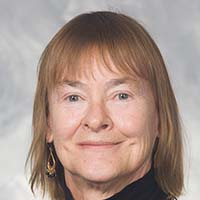Cathy Middlecamp
Position title: Professor Emerita, Environmental Studies
Website: Cathy Middlecamp's website
Email: chmiddle@wisc.edu

Cathy Middlecamp is professor emerita in the Nelson Institute for Environmental Studies and an affiliate of the Department of Chemistry. From 2015 to 2020, she also served as the director for education and research at the Office of Sustainability.
Her scholarship lies at the intersection of science, people, and the planet. For her teaching and work bringing science to the general public, she has received awards at the local, state, and national levels.
Middlecamp served as the editor-in-chief for the 7th and 8th editions of Chemistry in Context, a 25-year national curriculum project of the American Chemical Society. This undergraduate textbook engages undergraduate students in learning chemistry in the context of real-world issues. Working on the project from 1996 to 2013, she served as the lead author for the chapters on air quality, acid rain, ozone depletion, polymers, food, nuclear energy, and sustainability.
She is a fellow of the AWIS (Association for Women in Science, 2003), AAAS (American Association for the Advancement of Science, 2004), and the ACS (American Chemical Society, 2009). She was elected chair of the ACS Division of Chemical Education in 2015 and of the AAAS Education Section in 2016. For each, she served a three-year term in the chair succession.
From the ACS, she has received three national awards, the first two sponsored by the Camille and Henry Dreyfus Foundation:
- 2006 Award for Encouraging Women in Careers into the Chemical Sciences
- 2015 Award for Encouraging Disadvantaged Students into Careers in the Chemical Sciences
- 2019 George C. Pimentel Award for Excellence in Chemical Education
As part of her work with undergraduate students in the Nelson Institute, Middlecamp served as the faculty co-director of CESP (Community and Environmental Scholars Program). With her Nelson colleagues Rob Beattie and Molly Schwebach, she taught the CESP seminar (Environmental Studies 402) every semester. As part of her work with graduate students Middlecamp is a faculty affiliate of CHE (Center for Culture, History, and the Environment) and served on its steering committee for two terms.
Middlecamp was an undergraduate Cornell University (1968-72), graduating Phi Beta Kappa with distinction in all subjects. She was awarded a Danforth Fellowship for graduate study and earned her doctorate in chemistry from the University of Wisconsin-Madison in 1976.